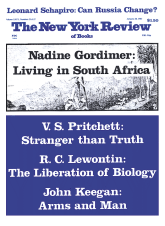In response to:
Body, Mind, and Machine from the October 21, 1982 issue
To the Editors:
I have always thought authors foolish who reply hotly to negative reviews of their books; usually they sound like soreheads or excuse-makers, and in any case the reviewer is generally given the last word—which is far less likely to be an admission of error than a redoubled thwacking of the hapless author, Nonetheless, I find myself compelled to object in public to certain misleading aspects of David Joravsky’s review of my book The Universe Within [nyr, October 21], if only so that those readers who know of this book no more than what they read in his review will learn that, at least in my opinion, his review contains certain serious and possibly deliberate falsifications.
Professor Joravsky is certainly within his rights to disagree with my monistic view of the mind-body problem, and to mock my book for its enthusiasm about the methods and findings of cognitive science. But it is either sloppy or unconscionable of him to write that I portray the computer as the chief vehicle of exploration of the human mind; I very clearly show a number of more human avenues—reaction-time studies, protocol analysis, child development research, and psycholinguistics, to name but a few—as being of comparable importance. But in order to portray me as a computer monomaniac, he quotes me as saying that “mind is mind, no matter what its physical embodiment,” though he had to know, or should have recognized, that this was a paraphrase of the position taken by Herbert Simon and various others—but very clearly not by me. Either Professor Joravsky read what I wrote and failed to understand it (an unlikely supposition) or chose to quote out of context and distort my view in order to strengthen his own message (a supposition I find distasteful but unavoidable).
Similarly, he charges me with echoing “the scientistic sneer at consciousness of self as an illusion, founded on the fantasy of some ‘homunculus’ within our brain.” In fact I did quite the opposite: I said that while little is known of the consciousness of self, it is one of the major differences between human and artificial intelligence. If I sneered, it was at the idea of the homunculus, a beguiling (but groundless) explanation of consciousness of self, which I characterized as a most significant phenomenon that may some day be explained by cognitive science—but certainly not through purely imaginary entities of the kind so often engendered by dualism, with all its untestable conjectures about the nature of incorporeal Mind or Spirit.
These two examples will serve, I hope, to make the point that, for reasons of his own, Professor Joravsky chose to attack a straw man (or perhaps a straw book), neatly demolishing its errors and pinpointing its distortions. But it wasn’t my book he thus disposed of; it was one of his own fabrication, which he unfairly identified with mine. The readers of The New York Review, and I, deserved better of him, since his discipline, history, has always been supposed to rank truthfulness as paramount in its scale of values.
Morton Hunt
Millwood, New York
David Joravsky replies:
“Cheerful eclecticism” was my central characterization of Hunt’s book. Evidently he is not very cheerful when someone calls attention to his superficiality and inconsistency. The ai quote that he objects to—“mind is mind, no matter what its physical embodiment”—was immediately followed in the review by: “Yet Hunt is a sufficiently thorough reporter to retail the subversive views of infidels and heretics.” And the review goes on to quote him quoting rival authorities on the shortcomings of the AI creed. The point was, and is, that Hunt is quite unconvincing in his burbly talk of some new “cognitive science” overcoming the contention of rival creeds, bringing victory to his monistic faith. Similarly with my observation that Hunt “respectfully repeats the scientistic sneer at consciousness of self as an illusion, founded on the fantasy of some ‘homunculus’ within our brain.” He does respectfully repeat that sneer (see pp. 100-101), and he does elsewhere repeat other, inconsistent views of consciousness of self. What he fails to do, in the cheerful book and in the angry letter, is to think seriously. The war of psychological schools cannot be ended by draping a phrase, “cognitive science,” over their opposed metaphysical premises.
This Issue
January 20, 1983



